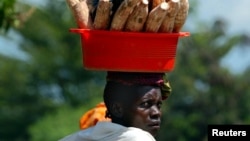Recent studies indicate Africa's little, and little-known, country of Burundi is the hungriest place on earth. War, poverty and overpopulation have left up to two thirds of the residents with chronic food shortages, stunting people's growth physically and also professionally, while rising demands for scarce resources pose serious problems for Burundi's stability. In Ngozi province, in the north, charities are using a variety of methods to fight the war on hunger.
Along many of the hillsides in Burundi's northern Ngozi province, rows of workers are digging and planting to try and stop fertile soils from sliding away.
The United Nations World Food Program's cash for assets scheme is currently paying more than 5,700 local farmers to work other people's lands after years of trying and failing to beat hunger by toiling their own.
Farmers like 50-year-old Matthias Bukuru say that the $1.25 wage he's paid is a fortune compared to the self-enforced slavery he used to put himself through, only to still go hungry.
He said the worst job he had was farming for someone and being paid 12 cents a day.
"The worst job was when I used to farm for someone for a day and he paid me 200 Burundian francs per day, which would only buy me a small basket of sweet potatoes to bring home to eat, and that wouldn't even feed the family," said Bukuru.
Studies by the International Food Policy Research Institute, a malnutrition watchdog, place Burundi last in 79 countries surveyed on food and poverty issues.
A twelve-year civil war that ended in 2005 left much fertile land fallow for too long, or repossessed, while overpopulation has increased the pressure on food production.
Bukuru and many others, whose outsized clothes make them appear like teenagers, say that they returned home after years in exile to infertile land and had no money to regenerate it.
Jean-Dominique Masumbuko, Agricultural Coordinator for Christian charity World Vision, said that the signs of hunger and poverty are literally written on the faces of the people who sign up for the project.
"It's visible, you can see it, and even see that they have no strength, you can see in their face that they haven't had enough to eat. Another clue is the lack of blood, it's like you can see that they're almost dry," said Masumbuko.
At a nearby clinic, wailing babies, sullen children and skinny mothers line the benches. Some have children already enrolled in a WFP feeding program for chronically underweight children and breastfeeding mothers.
One woman, Pascaline Minani, has a 6-year-old son in the program, but walked 5 kilometers with her baby to see if she could get supplements to ensure the baby won't be chronically hungry from birth as she breastfeeds.
Sadly, Minani's measurements show that she's not quite thin enough, in an area where food aid plugs the gap between the majority who are moderately hungry and the ten percent who fall into a severe category and receive hospital treatment.
Minani tells an all too familiar tale of not having enough land to cultivate and of disease, which this year has wiped out her green beans and cassava, a tasteless but stomach-filling staple crop. Her only hope is for a small harvest of potatoes. Her only wish is to feed her children once a day and, if there's enough, herself, in a place where hunger occupies the minds of those with constantly empty bellies.
"I can't stop thinking about food. When I'm hungry, I try to get something, but I often don't and I don't feel well. I just drink water or just stay hungry, as I have no choice. I can't even find the words to explain how it is to live like this," she said.
WFP said recent studies show that feeding and agricultural programs have reduced malnutrition rates nationwide from 58 to 49 percent, and that Burundi's government is eager to eradicate hunger.
But in a country where land officials say that disputes over a few meters of turf are turning deadlier, and the population is booming, the war on hunger is far from won.




